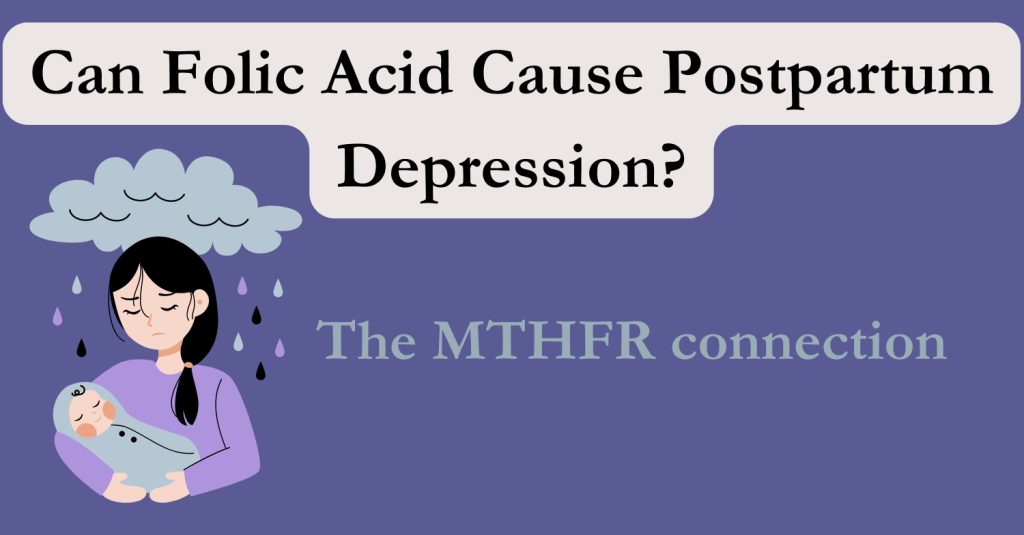If you’re pregnant or planning to conceive, you’ve probably heard how important folic acid is for your baby’s development. It helps prevent neural tube defects, but what if I told you the folic acid you’re taking could also increase your risk of postpartum depression (PPD)?
Let’s explore the connection between folic acid, the MTHFR gene mutation, and how it all impacts your mental health, especially after birth.
What Is the MTHFR Mutation and How Does It Affect You?
MTHFR stands for methylenetetrahydrofolate reductase, an enzyme. (and Yes! I remember its name as M*ther F*ckr!)
The MTHFR gene mutation is more common than you might think—up to 40% of people have it. The mutation affects how well your body can process and convert (methylate) folic acid, which is critical for your brain’s ability to produce neurotransmitters like serotonin and dopamine. These neurotransmitters are responsible for keeping your mood stable.
In people with the MTHFR mutation, the enzyme that converts synthetic folic acid (found in many prenatal vitamins) into L-methylfolate (the active form your body can actually use) doesn’t work properly. This can leave you with lower levels of bioavailable folate, which is essential for cell repair, DNA synthesis, and neurotransmitter production. Without enough folate, your brain struggles to produce the chemicals that help regulate your mood—leading to an increased risk of depression and anxiety. Without it you also have increased risks of bad complications including neural tube defects like spina bifida, pre-eclampsia, miscarriage, and placental problems.
Making this a very important topic!
The Folic Acid-Postpartum Depression Link
If you have the MTHFR mutation, your body may not effectively absorb folic acid from typical prenatal vitamins. This can leave you deficient in folate, even if you’re taking supplements, and set you up for trouble for complications and postpartum mental health struggles.
When your folate levels are low, your body also struggles to break down homocysteine, an amino acid in the blood. High homocysteine levels are linked to inflammation, cardiovascular problems (such as gestational hypertension, pre-eclampsia), and mental health issues like depression.
So, if you’re struggling with fatigue, mood swings, or feeling more anxious than usual during pregnancy—or even getting nauseous from your vitamins—it could be a sign that your body isn’t processing folic acid well and could more preventative support during pregnancy.
Could You Have the MTHFR Mutation?
Some signs that you might not be absorbing folic acid properly and could be at a higher risk for PPD and complications:
– Fatigue or feeling overwhelmed during pregnancy
– Mood swings or heightened anxiety
– Family history of depression
– Difficulty with concentration or more pronounced “pregnancy brain”
– Nausea when taking prenatal vitamins
If any of these sound familiar, it might be worth checking your MTHFR status. A simple blood test can determine if you have the mutation. Partner with prenatal BodyTalk to support you innate ability to heal and balance for a more holistic approach.
How to Prevent Postpartum Depression If You Have the MTHFR Mutation
The key is making sure you’re getting bioavailable folate, not just any folic acid. Here’s how to protect your mental health during and after pregnancy:
1. Switch to L-methylfolate: If you have the MTHFR mutation (or even if you don’t), switching to a prenatal vitamin that contains L-methylfolate can make a huge difference. This form of folate is already activated, so your body doesn’t have to convert it.
2. Focus on Folate-Rich Foods: Incorporate natural sources of folate into your diet, such as leafy greens, lentils, avocados, and citrus fruits. These are more easily absorbed by the body than synthetic folic acid.
3. Help Your Body Heal: Pregnancy and postpartum are intense emotional journeys. Take time to process emotions and seek support if needed. Practices like BodyTalk, somatic awareness, and grounding exercises can help release stored emotions and bring balance to your mind and body.
4. Get Tested: Ask your healthcare provider about testing for the MTHFR mutation if you suspect it. Knowing your status can help you make more informed choices about your health and supplementation.
5. Listen to Your Body: If you’re feeling more anxious, fatigued, or down than usual, don’t ignore it. It might be your body’s way of telling you that it needs more support—whether that’s through nutrition, supplements, or holistic care.
Emotional and Energetic Factors of Postpartum Depression
Beyond genetics and nutrition, it’s important to remember that postpartum depression can also stem from unprocessed emotions or stressful life experiences. Pregnancy and birth are profound emotional shifts. During this time, unresolved emotional trauma can surface, contributing to feelings of overwhelm or depression.
As a BodyTalk Birthkeeper, I believe that anything happening physically is mirrored emotionally. From this perspective, postpartum depression may also be the result of stored emotions that haven’t been processed, and now need to be released. I can teach you mind-body practices like cortices tapping, grounding, and emotional processing techniques, you can support both your mental and physical well-being during this transition.
Take Action to Support Your Mental Health
I help provide you with the most up-to-date information so you can make informed decisions. But let’s face it, there’s still so much we don’t know—or even get wrong (remember when smoking during pregnancy was considered okay?). It can be overwhelming to think that something as common as taking the wrong prenatal vitamin might cause harm to you or your baby. I understand how scary it can be to navigate these unknowns.
That’s why my process is all about helping you tune in, listen to your body and your baby, and develop a deep understanding of what you truly need and don’t need. Ultimately, you are the expert on your body—let’s trust in that wisdom and work together to make decisions that align with what feels right for you.

